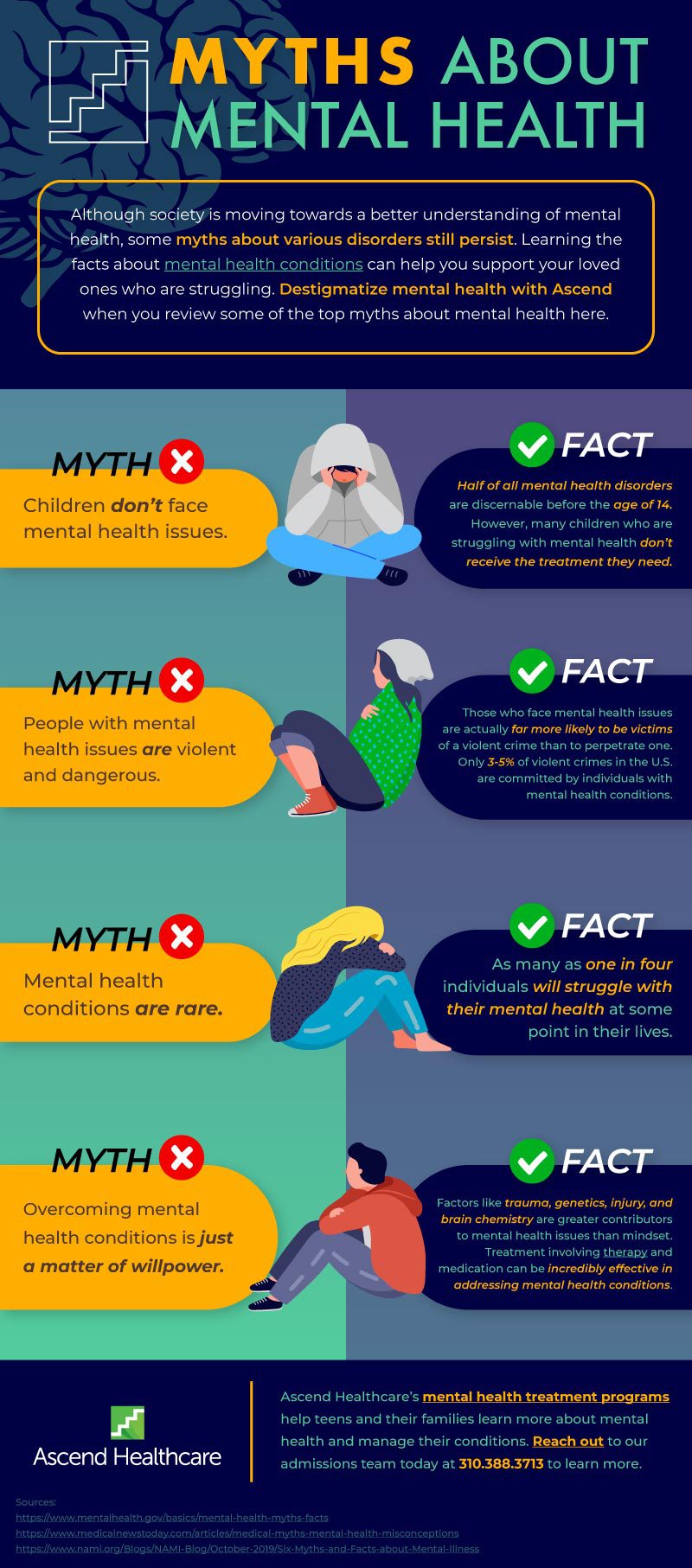Mental illness is often associated with myths and misconceptions, which further accentuates the problem of stigmatization and discrimination among the people suffering from it. In the United States alone, nearly 43.8 million people experience some form of mental illness. Whether it’s depression, anxiety, or schizophrenia, mental illness can be just as debilitating as physical illnesses. This article debunks ten common myths on mental illness, including the misconception that it’s not a real illness, caused by weakness or character, or not effectively treated by therapy. It also highlights the fact that mental illness can affect anyone, regardless of age, race, gender, nationality, or socioeconomic status, and with appropriate treatment and management, many people with mental illness can recover and lead fulfilling lives.
10 Common Myths About Mental Illness Debunked
Mental illness is an extremely misunderstood topic. Too often, people make assumptions or generalizations that are simply not accurate. There are many myths surrounding mental illness that can often lead to stigmatization, discrimination or simply misinformation. There is still a lack of knowledge when it comes to mental illness which leads to trivializing the seriousness of these conditions. In this article we will explore 10 common myths about mental illness and debunk them with factual information.
1. Mental illness is not a real illness
Mental illness is a real illness. Although the symptoms may not present physically, they can be just as debilitating as physical illnesses. Mental illness is caused by chemical imbalances in the brain, environmental factors or genetics. Mental illnesses such as depression, anxiety and schizophrenia can be effectively medicated and managed in a similar fashion to physical illnesses such as high blood pressure or diabetes.
2. Mental illness is rare
Mental illness is not rare. One in five adults in the United States experience mental illness every year. This means that nearly 43.8 million people experience some form of mental illness yearly. Some mental illness can be severe and debilitating whereas others are less severe and easier to manage. Regardless of the severity of the mental illness everyone deserves access to adequate treatment.
3. Mental illness is caused by weakness or lack of character
Mental illness is not caused by weakness or a lack of character. Mental illness is caused by various factors, including genetics, environment, trauma and brain chemistry. It is not a matter of being strong enough to overcome a mental illness, rather it is a matter of getting the appropriate treatment to manage symptoms and promote a healthier lifestyle for individuals.
4. Therapy is not effective
In fact, therapy can be immensely effective in treating mental illness. Some mental illness can be treated with therapy alone, while other forms of illnesses may require a combination of therapy and medication. Talking to a professional can provide an individual with the necessary tools to help them manage their symptoms and overcome their difficulties.
5. Only certain people develop mental illness
Mental illness does not discriminate. It can affect anyone regardless of age, race, gender, nationality or socioeconomic status. Mental illness is an equal opportunity issue which can arise due to genetics, trauma, stress or a range of environmental factors. It is important to recognize that anyone can develop a mental illness and everyone deserves access to the appropriate treatment.
6. Mental illness is only caused by traumatic experiences
While it is true that traumatic experiences can lead to the development of mental illness, mental illness can also be caused by other factors such as genetics, brain chemistry or environmental factors. It is important to recognize that traumatic events can lead to the development of mental illness however this is not the only cause.
7. Medication is not beneficial for mental illness
Medication can be very beneficial for those struggling with mental illness. Anti-depressants, anti-anxiety medication and antipsychotic medicine has been found to be effective in treating various forms of mental illness. It is important to note that medication does not work for everyone and other forms of treatment may be more effective for some individuals. It is important to have a conversation with a medical professional to discuss the options that would be most effective for each individual.
8. Mental illness is permanent
Mental illness is not always permanent. With the appropriate treatment and management, many individuals with mental illness are able to recover and live fulfilling lives. Like physical illness, it is important to seek treatment at the earliest indication of mental illness. Early intervention is key to recovery and successful management of mental illness.
9. People with mental illness are violent
This is not necessarily true. Too often people unjustifiably assume that those with mental illness are violent or dangerous. However, this is simply not the case. Mental illness like bipolar disorder, depression, and schizophrenia can severely impact a person’s wellbeing, but it doesnt make them more violent nor does it mean that all individuals with mental illness are prone to violent outbursts. It is important to recognize that people with mental illness deserve the same respect and equality as everyone else.
10. People with mental illness can just “snap out of it” or try harder
It is not easy or simple for someone with mental illness to “snap out of it” or try harder. Mental illness is not a choice, and no one can just simply overcome their illness through sheer willpower. Mental illness can be managed and treated, but it takes time and effort to recognize the signs and symptoms an individual may display. It is important to recognize the difficulties that individuals with mental illnesses face and support them in any way possible.
Conclusion
Mental illness is still widely misunderstood and there are many myths that need to be debunked. Mental illness is a real illness that affects millions of people worldwide. It is important to recognize that individuals with mental illness deserve treatment, compassion and support. By increasing our knowledge of mental illness, we can all work towards reducing stigmatization and discrimination towards those who are struggling with mental illness.
